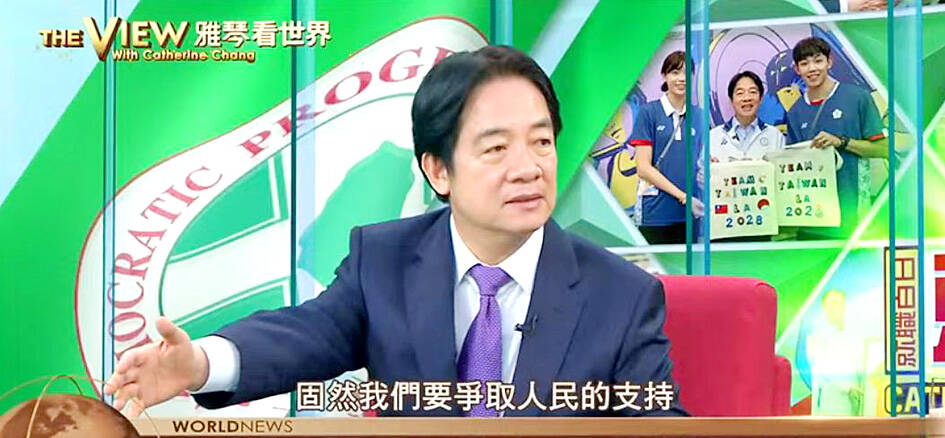China’s ambition to annex Taiwan is based on a desire to change the rules-based international order, rather than a desire for territorial gains, President William Lai (賴清德) said in an interview.
During an appearance on the talk show The View With Catherine Chang, aired last night, Lai said China aimed to achieve hegemony, and that peace and stability in the Taiwan Strait was an issue of worldwide concern.
During the interview, Lai also discussed his “four-pillar plan” for peace and prosperity, which he first outlined in an article published by the Wall Street Journal on July 4 last year. That plan includes bolstering Taiwan’s military deterrence, treating economic security as national security, developing partnerships with other democracies, and maintaining steady and principled leadership on cross-strait issues.

Photo: Screengrab from CH50’s YouTube channel
Lai cited recent expressions of support for Taiwan from the international community, including those from Japanese Prime Minister Fumio Kishida, US President Joe Biden, US Secretary of State Antony Blinken and the leaders of some EU countries, as well as statements made during the G7 summit in June.
Those statements all said that “maintaining peace and stability across the Taiwan Strait is indispensable to international security and prosperity,” Lai said, adding that they illustrated the need for Taiwan to “stand united with the international democratic camp.”
On the issue of economic resilience, Lai said that only 11.4 percent of Taiwan’s overseas investments last year were in China, down significantly from 83.8 percent in 2010.
Taiwanese businesses are dispersing those investments elsewhere including Japan, the US, Europe and Southeast Asia, he said.
Commenting on regional security alliances, Lai cited the establishment of the Quadrilateral Security Dialogue, the AUKUS security partnership, the Five Eyes alliance and the US-Japan-Philippines summit, which he said showed that democracies are cooperating near the Taiwan Strait.
Responding to rumors that Washington was concerned about Lai lacking diplomatic experience, and that it did not want him to transit through the continental US, Lai denied them and said that he did not have any plans to visit the US in the immediate future.
A White House official also dispelled rumors about US concerns about Lai’s administration during a news conference on Aug. 23.
“Everything that we have seen come out of Taipei indicates that the current leadership remains committed to maintaining status quo, and peace and stability,” the official said.

Conflict with Taiwan could leave China with “massive economic disruption, catastrophic military losses, significant social unrest, and devastating sanctions,” a US think tank said in a report released on Monday. The German Marshall Fund released a report titled If China Attacks Taiwan: The Consequences for China of “Minor Conflict” and “Major War” Scenarios. The report details the “massive” economic, military, social and international costs to China in the event of a minor conflict or major war with Taiwan, estimating that the Chinese People’s Liberation Army (PLA) could sustain losses of more than half of its active-duty ground forces, including 100,000 troops. Understanding Chinese

The Ministry of Foreign Affairs (MOFA) yesterday said it is closely monitoring developments in Venezuela, and would continue to cooperate with democratic allies and work together for regional and global security, stability, and prosperity. The remarks came after the US on Saturday launched a series of airstrikes in Venezuela and kidnapped Venezuelan President Nicolas Maduro, who was later flown to New York along with his wife. The pair face US charges related to drug trafficking and alleged cooperation with gangs designated as terrorist organizations. Maduro has denied the allegations. The ministry said that it is closely monitoring the political and economic situation

UNRELENTING: China attempted cyberattacks on Taiwan’s critical infrastructure 2.63 million times per day last year, up from 1.23 million in 2023, the NSB said China’s cyberarmy has long engaged in cyberattacks against Taiwan’s critical infrastructure, employing diverse and evolving tactics, the National Security Bureau (NSB) said yesterday, adding that cyberattacks on critical energy infrastructure last year increased 10-fold compared with the previous year. The NSB yesterday released a report titled Analysis on China’s Cyber Threats to Taiwan’s Critical Infrastructure in 2025, outlining the number of cyberattacks, major tactics and hacker groups. Taiwan’s national intelligence community identified a large number of cybersecurity incidents last year, the bureau said in a statement. China’s cyberarmy last year launched an average of 2.63 million intrusion attempts per day targeting Taiwan’s critical

AGING: As of last month, people aged 65 or older accounted for 20.06 percent of the total population and the number of couples who got married fell by 18,685 from 2024 Taiwan has surpassed South Korea as the country least willing to have children, with an annual crude birthrate of 4.62 per 1,000 people, Ministry of the Interior data showed yesterday. The nation was previously ranked the second-lowest country in terms of total fertility rate, or the average number of children a woman has in her lifetime. However, South Korea’s fertility rate began to recover from 2023, with total fertility rate rising from 0.72 and estimated to reach 0.82 to 0.85 by last year, and the crude birthrate projected at 6.7 per 1,000 people. Japan’s crude birthrate was projected to fall below six,